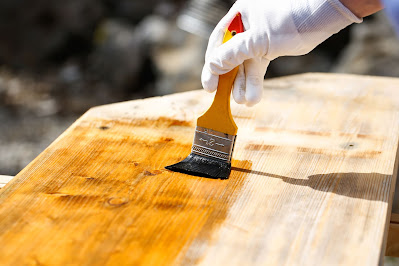Wood Coatings are a type of substance that is put to a wooden surface to protect it from natural and man-made elements.
 |
| Wood Coatings |
Wood Coatings are additives or
combinations that are applied to the final wood product in order to improve its
overall qualities, such as durability, colour, and texture. Stains, varnishes,
paints, and other supplementary materials for indoor and outdoor use are
included in the category of wood coatings. After the wood has been dyed and
prepped, the coating is applied. Wood finishing is the process of putting a
coating to a completed wood product. Finishing is the final phase in the
manufacturing process, and it gives the wood surface desired properties
including moisture and heat resistance, better durability, and improved look.
Finishing also makes the finished object more sanitary and simpler to maintain.
Shift to more ecologically
friendly materials, such as water-borne chemicals rather than solvent-borne
chemicals. Wood Coating is used by manufacturers of wooden furniture and
associated furnishings to give low-cost wood the appearance and texture of
higher-end wood. These items are mostly aimed at price-sensitive countries like
Asia Pacific and Latin America. These customers are less concerned with the
quality of the wood and are more concerned with its visual appeal.
Types of Wood Coatings-
·
Shellac
·
Wood Preservatives
·
Water Repellents
·
Stains
·
Linseed Oil
·
Beeswax and Carnauba wax mixtures
·
Acrylic Paint
Various Applications where Wood Coatings are used-
·
Furniture
·
Siding
·
Flooring
·
Decking
·
Door
·
Cabinets
Wood
Coatings is expected to benefit from the growing construction
industry and rising population. The building industry's expansion is aided by
the growing population. In the retail industry, wooden shelves and displays are
commonly utilized to increase the visual attractiveness of the objects on show.
Health difficulties such as skin and eye irritation, as well as asthma caused
by direct contact with wood coatings, are key commercial downsides.
Furthermore, prolonged exposure to air and sunlight causes these coatings to
fade with time, causing the damaged regions to look yellowish.
All environmental agents that can
affect the wood are included in this category. Wood coatings, to put it another
way, work as a lifeguard for any wooden item. Outside and boards, frames,
garden and street furniture, modern and replica furniture, kitchens, doors,
furnishing accessories, and traditional flooring may all be treated with wood
coatings. Wood coats make it easy to clean and disinfect wood. It also aids in
the closure of pores that might serve as bacterial breeding grounds. Coatings
are the final phase in the wood finishing process, and they provide a pleasing
look to wooden surfaces. Wood coatings may also be used to create custom wooden
designs. Wood finishing make it looks attractive, perform well for a longer
time and increase its durability. These wooden finishing products can be useful
for both exterior wooden designs as well as interior wooden designs. Mostly,
people also refer wood coatings as wood polish and wood colors.



Comments
Post a Comment